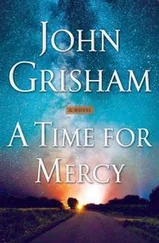“I know that,” she snaps. “It’s your weekend. You can do what you want.”
“True, but you have a way of complicating everything. I just don’t want any trouble, that’s all.”
“Your mother is nothing but trouble.”
Truer words were never spoken, and I nod in defeat. It would be a dramatic understatement to say that Judith and my mother hated each other from the opening bell. So much so that my mother informed me she would cut me out of her last will and testament if I married Judith. At the time, I was secretly having some serious doubts about our romance and our future, but that threat was the last straw. Though I expect Mom to live to be a hundred, her estate will be a delight. A guy with my income needs a dream. A subplot in this sad story is that my mother often uses her will to bully her children. My sister married a Republican and got herself cut out of the will. Two years later, the Republican, who’s really a nice guy, became the father of the most perfect granddaughter in history. Now my sister is back in the will, or so we think.
Anyway, I was preparing to break up with Judith when she gave me the crushing news that she was pregnant. I assumed I was the father, though I didn’t ask that loaded question. Later I learned the brutal truth that she was already seeing Gwyneth. Talk about a shot to the gut. I’m sure there were clues that my dearly beloved was actually a lesbian, but I missed every one of them.
We got married. Mom said she changed her will and I would get not a penny. We lived together off and on for five wretched months, were technically married for fifteen more, and split to save our sanity. Starcher arrived in the middle of the war, a casualty from birth, and we’ve been sniping at each other ever since. This ritual of meeting once a month for drinks is our homage to forced civility.
I think I’m back in my dear mother’s will.
“And what does Mummy plan to do with my child?” she asks. It’s never “our” child. She has never been able to resist the little digs, the sophomoric cheap shots. She picks at the scabs, but not even in a clever way. It’s almost impossible to ignore, but I’ve learned to bite my tongue. My tongue has scars.
“I think they’re going to the zoo.”
“She always takes him to the zoo.”
“What’s the harm in going to the zoo?”
“Well, last time he had nightmares about pythons.”
“Okay, I’ll ask her to take him somewhere else.” She’s already causing trouble. What could be wrong with taking a fairly normal seven-year-old boy to the zoo? I don’t know why we meet like this.
“How are things around the firm?” I ask, my curiosity similar to that of watching a car wreck. It’s irresistible.
“Fine,” she says. “The usual turmoil.”
“You need some boys in that firm.”
“We have enough problems.” The waiter notices both glasses are empty and goes for another round. The first drinks always disappear fast.
Judith is one of four partners in a firm of ten women, all militant lesbians. The firm specializes in gay law—discrimination in employment, housing, education, health care, and the latest: gay divorce. They’re good lawyers, tough negotiators and litigators, always on the attack and often in the news. The firm projects an image of being at war with society and never backing down. The outside fights, though, are far less colorful than the inside brawls.
“I could join as the senior partner,” I say in an effort at levity.
“You wouldn’t last ten minutes.” No man would last ten minutes in their offices. In fact, men avoid them zealously. Mention the name of her firm and men run for the hills. Fine fellows caught screwing around jump off bridges.
“You’re probably right. Do you ever miss sex with the opposite sex?”
“Seriously, Sebastian, you want to talk about straight sex, after a bad marriage and an unwanted child?”
“I like straight sex. Did you ever like it? You seemed to.”
“I was faking.”
“You were not. You were pretty wonderful, as I recall.” I know two guys who slept with her before I came along. Then she ran to Gwyneth. I’ve often wondered if I was so lousy in bed that I drove her to switch teams. I doubt it. I must say she has a good eye. I loathed Gwyneth, still do, but the woman could stop traffic on any street in town. And her current partner, Ava, once modeled lingerie for a local department store. I remember her ads in the Sunday newspaper.
The second drinks arrive and we grab them.
“If you want to talk about sex, I’m leaving,” she says, but she’s not angry.
“I’m sorry. Look, Judith, every time I see you I think about sex. My problem, not yours.”
“Get help.”
“I don’t need help. I need sex.”
“Are you propositioning me?”
“Would it do any good?”
“No.”
“Didn’t think so.”
“You have fights tonight?” she asks, changing the subject, and I don’t resist.
“I do.”
“You’re sick, you know. That’s such a brutal sport.”
“Starcher says he wants to go.”
“You take Starcher to the cage fights and you’ll never see him again.”
“Relax. I’m just joking.”
“You may be joking, but you’re still sick.”
“Thank you. Have another drink.” A shapely Asian in a short, tight skirt walks by and we both have a look. “Dibs,” I say.
The alcohol kicks in—it takes longer for her because she is naturally wound tighter—and Judith manages a grin, the first of the evening. Could be the first of the week. “Are you seeing anyone?” she asks, her tone noticeably softer.
“Not since we last met,” I say. “It’s been all work.” My last girlfriend said good-bye three years ago. I get lucky occasionally, but I’d be lying if I said I was on the prowl for a serious woman. There is a long, heavy gap in the conversation as we get bored. When we’re down to the last few drops of our drinks, we go back to Starcher and my mother and the next weekend that we both now dread.
We walk together out of the bar, dutifully peck each other on the cheek, and say good-bye. Another box checked off.
I loved her once, then I truly hated her. Now I almost like Judith, and if we can continue these monthly meetings, we might become friends. That’s my goal, because I really need a friend, one who can understand what I do and why I do it.
And it would be much better for our son, too.
7.
I live on the twenty-fifth floor of a downtown apartment building, with a partial view of the river. I like it up here because it’s quiet and safe. If someone wanted to bomb or burn my apartment, it would be difficult without taking down the entire building. There is some crime downtown, so we live with plenty of video surveillance and guards with guns. I feel secure.
They fired bullets into my old apartment, a duplex on the ground floor, and they firebombed my old office five years ago. “They” have never been found or identified, and I get the clear impression the cops aren’t looking that hard. As I said, my line of work inspires hatred and there are people out there who’d love to see me suffer. Some of these people hide behind badges.
The apartment has a thousand square feet, with two small bedrooms, an even smaller kitchen, seldom used, and a living area that’s barely big enough to hold my only substantial piece of furniture. I’m not sure a vintage pool table should be classified as furniture, but it’s my apartment and I’ll call it what I want. It’s nine feet long, regulation size, and was built in 1884 by the Oliver L. Briggs company in Boston. I won it in a lawsuit, had it perfectly restored and then carefully reassembled smack in the middle of my den. On an average day, or when I’m not away in cheap motels dodging death threats, I rack ’em up time after time and practice for hours. Shooting pool against myself is an escape, a stress reliever, and cheap therapy. It’s also a throwback to my high school days when I hung out at a place called The Rack, a real local dive that’s been around for decades. It’s an old-fashioned pool hall with rows of tables, layers of smoke, spittoons, cheap beer, some petty gambling, and a clientele that acts tough but knows how to behave. The owner, Curly, is an old friend who’s always there and keeps it running smoothly.
Читать дальше












